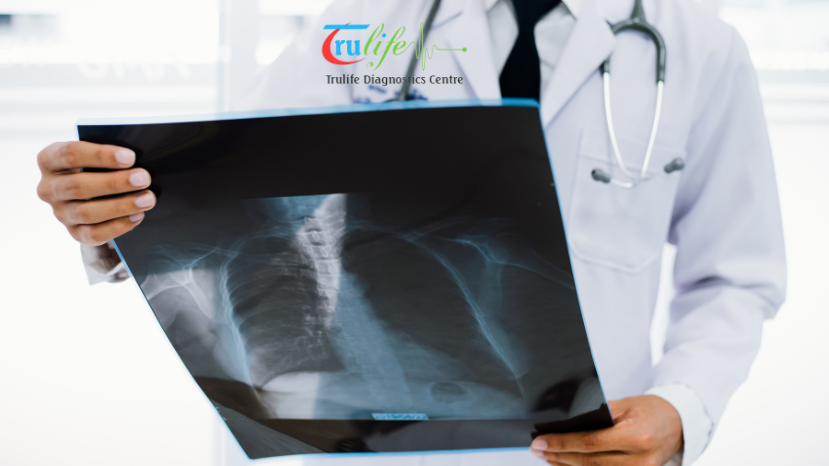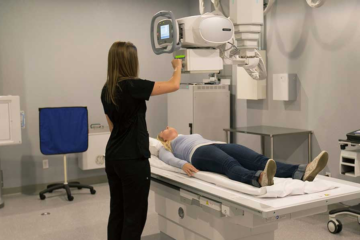
Digital X-Rays in Hyderabad | Know Why They Are Better | Trulife Diagnostics
Pain in a particular part of your body indicates some weakness or flaw. Digital X-rays can detect such flaws which further helps in the detection of a disease or deficiency. Technology has evolved so much that traditional x-rays which have slightly higher radiations, are being replaced by digital x-rays. The science of a digital imaging produces images and stores them for future analysis, giving it an edge over the traditional method. At Trulife Diagnostics Centre, digital x-rays in Hyderabad are produced with ease and comfort.

The Difference Between Traditional X-Rays and Digital X-Rays
Any X-ray is used to scan problems and developments in bones and organs such as lungs. However, due to recent technological advancements have modern X-ray system has replaced the older X-ray system. Here are a few differences between a traditional X-ray and a digital X-ray:
1. A traditional X-ray needs development of long films, while a digital X-ray, does not require a film, but rather uses digital imaging with the help of a camera. This is the reason why the later is quicker than the former.
2. A traditional X-ray has lower quality as compared to a digital X-ray which produces high quality, and high resolution images.
3. A digital radiography produces lower level of radiations than a traditional X-ray.
4. Many diagnostics centres face storage problems of film reels, however, with digital imaging, the storage problems have been resolved as these X-rays are stored digitally.
Different Types of Digital X-Rays
Each type of digital X-ray plays a vital role in modern healthcare, facilitating accurate diagnosis and improving patient outcomes. If you live in Hyderabad, then you can visit Trulife Diagnostics Centre to get the following digital X-rays done:
1. Plain X-rays: also known as radiography, are fundamental in capturing images of bones and some organs. They involve exposing a specific body part to X-ray beams, which are then captured on film or digitally for analysis.
2. Fluoroscopy: This X-ray provides real-time moving images, crucial for procedures like guiding catheters or evaluating the digestive system’s function.
3. Computed Tomography (CT) Scans: These X-rays use multiple X-ray images to create cross-sectional views of bones, organs, and tissues, aiding in precise diagnosis and treatment planning.
4. Digital Radiography (DR): A DR enhances efficiency by capturing X-ray images directly onto a computer, offering immediate viewing and manipulation.
5. Mammography: This X-ray is very important for women as it is used in breast imaging, using low-dose X-rays to detect early signs of breast cancer. Physicians advise women to regularly go for mammography to detect early signs of breast cancer.
Precautions Before Going For an X-Ray
While X-rays are generally safe and effective, taking a few precautions before undergoing the procedure can enhance safety and ensure accurate results. Here are some important considerations to keep in mind before going for an X-ray:
1. Inform Your Healthcare Provider:
Before scheduling an X-ray, inform your healthcare provider about any medical conditions you have, allergies (especially to contrast materials used in certain types of X-rays like CT scans), medications you are taking (especially if they contain iodine), and if you might be pregnant. Pregnant women should generally avoid X-rays unless absolutely necessary, as radiation can potentially harm the developing fetus.
2. Wear Appropriate Clothing:
Depending on the body part being imaged, you may be asked to change into a gown or remove jewelry, eyeglasses, or any metal objects that could interfere with the X-ray images. It’s advisable to wear comfortable clothing that can easily be removed or adjusted.
3. Follow Instructions for Preparation:
Specific types of digital radiography or X-rays may require preparation such as fasting (for abdominal X-rays) or drinking a contrast material (for certain CT scans). Follow any instructions given by your healthcare provider or the imaging facility to ensure the procedure goes smoothly and accurately.
4. Discuss Concerns About Radiation Exposure:
While modern X-ray equipment minimizes radiation exposure, it’s natural to have concerns, especially if you have had multiple X-rays in the past. Discuss your concerns with your healthcare provider who can explain the benefits of the procedure versus the risks of radiation exposure. Radiologists and technologists are trained to use the lowest possible dose of radiation to achieve clear images.
5. Arrange for Accompanying Person (if needed):
Some X-ray procedures may require sedation or cause discomfort, especially for elderly patients or those with mobility issues. It’s advisable to arrange for someone to accompany you if you think you might need assistance before or after the procedure.
6. Be Prepared for Potential Allergic Reactions:
If contrast material is used for your X-ray, there is a small risk of allergic reactions such as itching, hives, or more severe reactions in rare cases. Inform your healthcare provider if you have a history of allergies or previous reactions to contrast materials.
7. Follow Post-Procedure Instructions:
After the X-ray, your healthcare provider or the radiology staff may provide specific instructions, such as resuming normal activities or any restrictions based on the type of X-ray performed. Follow these instructions to ensure proper recovery and interpretation of the results.
By taking these precautions and following the guidance of your healthcare provider and radiology team, you can ensure that your X-ray procedure is safe, effective, and contributes to accurate diagnosis and treatment planning.
Why Choose Trulife Diagnostics Centre For X-Rays
When considering where to undergo X-ray procedures, Trulife Diagnostics Centre stands out as the best choice for several compelling reasons. Located in Hyderabad, Trulife Diagnostics Centre combines state-of-the-art technology with a commitment to patient care and comfort, making it a preferred destination for diagnostic imaging needs.
Trulife Diagnostics Centre is equipped with the latest in diagnostic imaging technology, ensuring high-quality digital X-ray imaging with minimal radiation exposure. Their facilities are staffed by experienced radiologists and technologists who are dedicated to providing accurate and detailed imaging results. This combination of advanced equipment and skilled professionals ensures that patients receive precise diagnoses and effective treatment plans.
Our diagnostics centre maintains rigorous standards of quality and safety as we are accredited by recognized regulatory bodies, ensuring adherence to guidelines for patient care, equipment maintenance, and imaging protocols.
Schedule your appointment with Trulife Diagnostics Centre to get your digital X-ray in Hyderabad done at the most affordable prices, and timely delivery of the reports. Contact us to book your appointment now!



